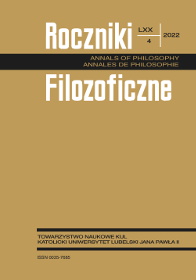ARGUING FOR FREEDOM OF RELIGION
ARGUING FOR FREEDOM OF RELIGION
Author(s): Paul GuyerSubject(s): Social history, Early Modern Philosophy, Philosophy of Religion, 17th Century, 18th Century, 19th Century, Sociology of Religion
Published by: Towarzystwo Naukowe KUL & Katolicki Uniwersytet Lubelski Jana Pawła II
Keywords: religion; freedom; toleration;
Summary/Abstract: My title is “Arguing for Freedom of Religion,” not for “Toleration,” because I follow the eighteenth-century writer Christoph Martin Wieland in taking “toleration" to connote a gift or indulgence from a majority to a minority, whereas true freedom of religion would put everybody on the same plane to believe and practice religion as they see fit, or not at all. I consider three historically distinct ways of arguing for freedom of religion: from a premise held by one religion that requires freedom from others (the strategy of Locke, Madison, and Mendelssohn); from a premise about the uncertainty of all religious beliefs which calls for equal freedom (Bayle and Wieland); or from a fundamental requirement of equal freedom for all, with no premise about religion although it entails freedom in religious matters as in other things (Hutcheson, Meier, Kant). The latter approach may be most appealing from a purely philosophical point of view, but the former styles of argument have obviously had much to recommend them in historical contexts, and may still be useful.
Journal: Roczniki Filozoficzne
- Issue Year: 70/2022
- Issue No: 4
- Page Range: 365-394
- Page Count: 30
- Language: English

